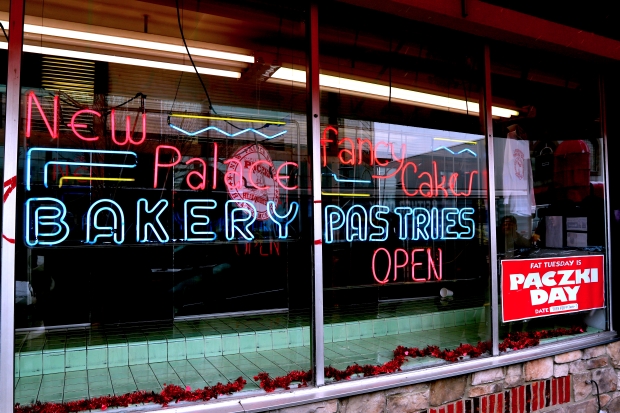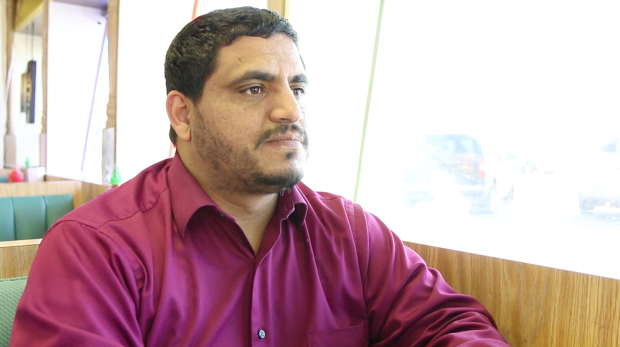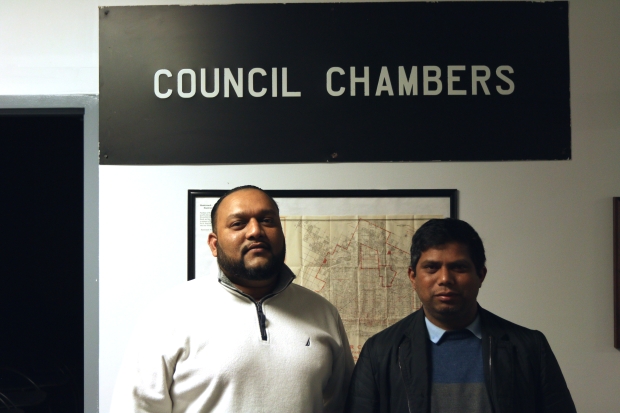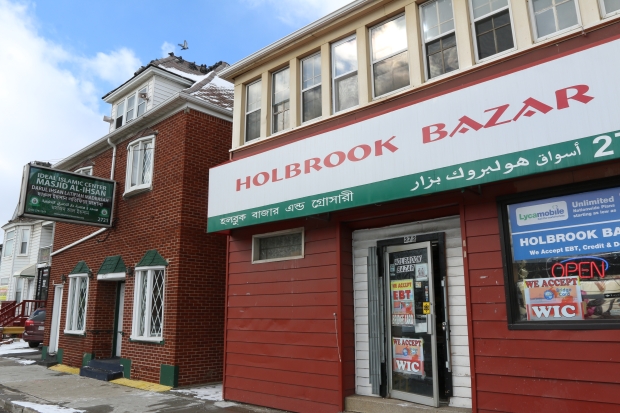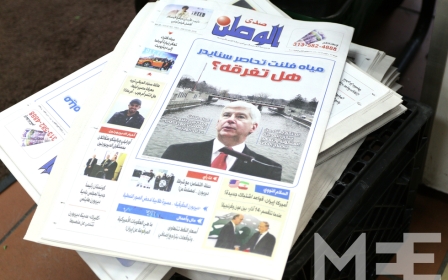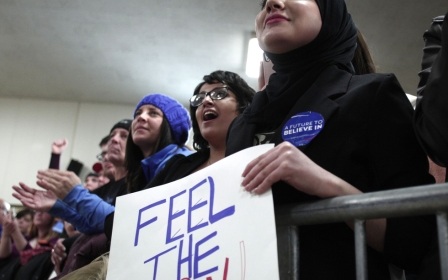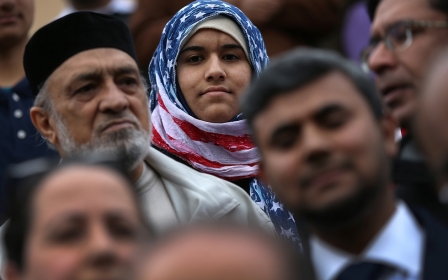American 'ideal made real' in first city with Muslim-majority council
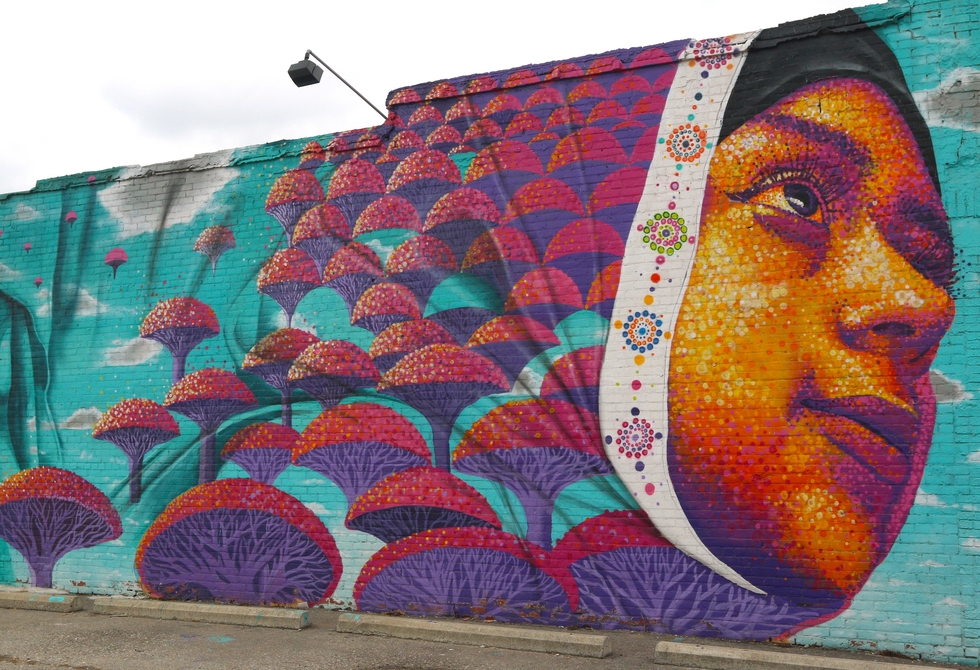
HAMTRAMCK, United States - The way the media has reported it, outsiders are likely to see Hamtramck, Michigan, as the epitome of racial and religious strife in the United States. In November, it became the first city in the country to elect a Muslim-majority city council.
“In many ways, Hamtramck is a microcosm of the fears gripping parts of the country since the Islamic State’s attacks on Paris,” the Washington Post reported shortly after the election.
But the mayor of the city, Karen Majewski, sees it differently. For her, Hamtramck is not a microcosm of fear, but “a microcosm of the American ideal”.
“What I don’t see is the kind of fear of terrorism, or the general panic that plays into a national narrative that I think national media kind of tries to fit Hamtramck into,” Majewski told Middle East Eye.
The 2.2-square-mile city - a densely packed enclave surrounded by Detroit - is known for its Polish Catholic character, but over the past 30 years Hamtramck (pronounced Ham-tram-ick) has attracted thousands of immigrants from Yemen (now 14 percent of the population), Bangladesh (15 percent) and Bosnia (five percent).
Hamtramck’s storefronts and establishments are a testament to its diversity – Yemeni and South Asian grocery stores, Polish bakeries and delis, bars for the punk youth scene and towny taverns for aging auto workers, and, of course, restaurants serving some of the finest, most authentic foreign cuisine in the state.
Residents of the surrounding communities of southeast Michigan are perhaps most likely to have visited Hamtramck on Fat Tuesday - known locally as Paczki Day. On the day before the start of Lent each year, hundreds of people swarm the tiny town to stand in line at their favourite Polish bakery to purchase a dozen or three of the sinfully fattening pastries.
According to the Post: “The influx of Muslims here has profoundly unsettled some residents of the town long known for its love of dancing, beer, paczki pastries and the pope.”
But for Mayor Majewski, who is of Polish descent, statements like this mischaracterise the reality of life in Hamtramck.
“I think that there were a couple of convenient narratives to fit us into. One was the general Fox News-fed, Donald Trump-fed, the-sky-is-falling-and-the-Muslims-are-taking-over-the-country narrative,” she told MEE.
“And then there was a kind of story they wanted to tell about the community itself that said that we were afraid of our neighbours, that there was general panic in Hamtramck, and it signalled a different city going forward.”
Majewski acknowledges that some long-time residents feel uneasy about the fact that the Hamtramck they knew and loved growing up is changing as their parents and grandparents age and pass away, but she says this is different from the way national media has presented the unease.
“I certainly have not tried to ignore or to deny those kinds of conversations and those kinds of anxieties that people have felt, but I think that they’ve been misinterpreted by folks from outside,” she told MEE.
“Even people who bitch and moan that Hamtramck isn’t what it used to be, it’s not the living museum of (their) grandparents … you ask those same people, ‘Well, what is it you love about Hamtramck?’ And one of the things they always say is ‘the diversity,’ that they like being around people from all over the world.”
Sharia law in Hamtramck?
Over the past three months, Hamtramck’s Muslim city council members say they have been asked over and over by media outlets whether they are going to instate Sharia, or Islamic law in Hamtramck. To them, the question is laughable.
“The (biggest) question that I was getting from the media organisations is: ‘Oh, are you guys going to try to bring Sharia law?’” newly elected Yemeni-American councilman Saad al-Masmari told MEE. It was al-Masmari's election that helped tipped the scale from a half-Muslim city council (three of six members) to a Muslim-majority council.
“And I was telling them, ‘Guys, we have the US constitution, we have the state law and we also have the city charter. We’re just going to go by all these three, nothing else. We’re not going to bring any rules or anything. We’re just going to try and help.”
Councilman Abu Musa, who is originally from Bangladesh, said he was frustrated by all the talk of Sharia law.
“It really got me upset when some of the … media said ‘Sharia law coming to Hamtramck.’ I have no clue what Sharia law means. The country I came from, I told you, the prime minister is female, the opposition leader is female, house speaker is female,” Abu Musa told MEE.
"I have no clue how people think this way.”
Councilman Mohammed Hassan, also Bengali-American, feels similarly.
“The first couple of interviewers (asked about) Sharia law. I said, ‘I come from Bangladesh - there is no Sharia law,” Hassan told MEE.
“In Hamtramck, I said, look at that! Woman walking. Muslim women walking. Some of them have (a headscarf), some of them don’t have. It’s freedom!”
“I go to the bar, like, once a week,” he added. “I don’t drink the beer, but I drink the Diet Coke. And I still talk to my friend who is drinking beer. There’s nothing wrong. So, there’s no issue.”
The councilmen emphasised that the issues facing Hamtramck were not issues of religion or ethnicity, but basic everyday issues that any community might face: funding, education, road repairs and supporting local businesses.
“Even when we were campaigning, people didn’t ever ask me, ‘What is your faith?’” councilman Anam Miah told MEE.
“They asked me, ‘How are you going to fix the pothole? How are you going to put more police officers on the street to patrol? How are you going to improve the quality of life?”
The (Muslim) American dream
For Miah, the recent media reports about Hamtramck have failed to portray the fact that Muslim-American immigrants are regular people who have the same goals as any other immigrant community in the country.
“The vast majority of the people come here with similar goals in mind, which is to find ways to chase the American dream,” Miah told MEE.
“How do you find ways to educate your children to better themselves? How do you work hard to provide that opportunity for them to go to college? How do you find ways to make sure their ideas and dreams are something that they can obtain and succeed in?”
Despite perceived heightened levels of Islamophobia in the US - especially in the wake of Republican presidential frontrunner Donald Trump calling for a ban on Muslims entering the country - none of the four Muslim councilmen said he had faced discrimination based on his religion, with the exception of occasional media misrepresentations.
In fact, Hamtramck’s non-Muslim residents have in the past come to the aid of the Muslim community in significant ways – most notably in 2004 when the city council, then with only one Muslim member, amended the noise ordinance to allow mosques to broadcast the call to prayer.
“Actually the Christian people helped the Muslim people to get the call for prayer,” Hassan told MEE. “It’s a very unique city. It could be (the) model of the world.”
Mayor Majewski was president of the city council at the time.
“We felt very strongly that this was an already-guaranteed right,” Majewski said.
“But we also felt – and this is aside from any legislation – we felt that this was part of Hamtramck’s cultural fabric, and from that perspective we welcomed the participation of all Hamtramck’s residents in all their diversity.”
For the mayor, rather than serving as a source of tension, the wide range of ethnicities and religions is one of Hamtramck’s best qualities.
“You come to see your neighbours, wherever they’re from, as human beings. And sometimes you argue with them and sometimes you celebrate with them, and that’s part of the kind of the ideal made real of American life,” Majewski said.
“You can talk about all these things idealistically and philosophically or whatever, but we live it, and we make those adjustments every day. And I think that’s one of the things that makes us so interesting to people from outside, and what makes us such a microcosm of the American ideal.”
New MEE newsletter: Jerusalem Dispatch
Sign up to get the latest insights and analysis on Israel-Palestine, alongside Turkey Unpacked and other MEE newsletters
Middle East Eye delivers independent and unrivalled coverage and analysis of the Middle East, North Africa and beyond. To learn more about republishing this content and the associated fees, please fill out this form. More about MEE can be found here.


